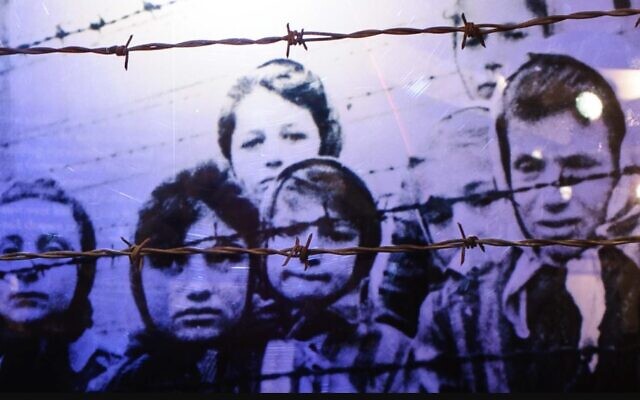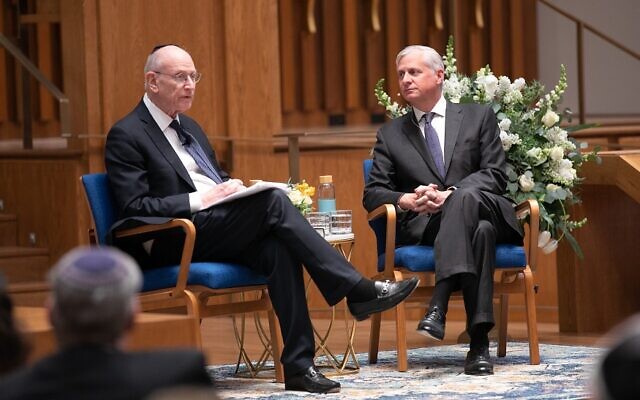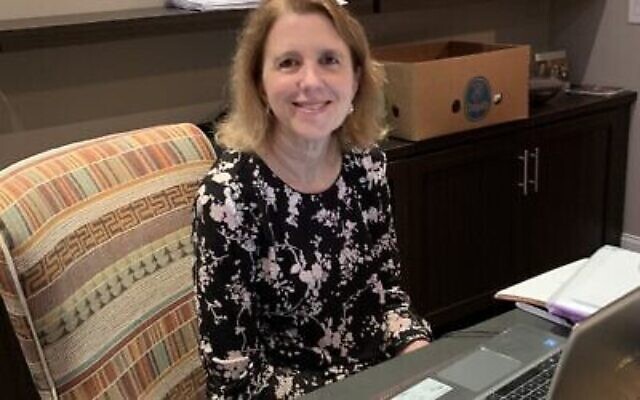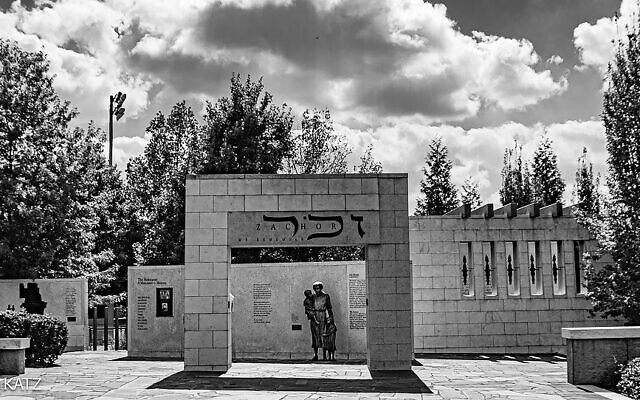[UPDATED] Holocaust Survivor Count Drops as Needs Remain
JF&CS Atlanta reports that more than half of its survivor clients receive Medicaid and nearly half also food stamps.
Dave Schechter is a veteran journalist whose career includes writing and producing reports from Israel and elsewhere in the Middle East.
A new estimate puts the number of Jewish Holocaust survivors in the United States at 38,400 — down from 50,000 two years ago and 109,900 in 2003.
A report released Jan. 23 by the Claims Conference, the organization that negotiates with Germany for reparations, estimated that — as of August 2023 — there were 245,000 Jewish survivors worldwide, nearly two-thirds fewer than 20 years ago.
The Global Demographic Report on Jewish Holocaust Survivors was released in advance of International Holocaust Remembrance Day on Jan. 27. The Claims Conference acknowledges that its estimate may be toward the low end of a range, as some survivors choose not to be identified and others may not consider themselves to be survivors.
According to the report, the U.S. accounted for 15.7 percent of the survivor population. Spread across more than 90 countries, 48.8 percent lived in Israel, 18.1 percent in North America, 17.5 percent in Western Europe, 11.8 percent in countries of the former Soviet Union, 2.5 percent in Eastern Europe, and the remainder in Oceania, South America and the Caribbean, Africa, and Asia.
In raw numbers, the U.S. trailed only Israel, home to 119,000 Jewish survivors. Of those in the U.S., 90 percent lived in 10 states, led by nearly 40 percent in New York, followed by California with 16 percent. In descending order, the others were Florida, Illinois, New Jersey, Massachusetts, Pennsylvania, Maryland, Ohio, and Michigan.

A fraction live in Georgia. Jewish Family & Career Services Atlanta estimates that more than 230 survivors live in the state, mostly in the Atlanta area, though there may be others not known to the agency. Its database lists 177 survivors who receive services through JF&CS and another 57 others who engage with JF&CS programming.
The median age of Jewish survivors worldwide is 86 years old. They range in age from 77 to 112, with 20 percent older than 90. Some 95 percent are “child survivors,” born between 1928 and 1946 (a small number were in utero in 1945 and born the next year). An estimated 61 percent are female and 39 percent male.
“The data we have amassed not only tells us how many and where survivors are, it clearly indicates that most survivors are at a period of life where their need for care and services is growing. Now is the time to double down on our attention on this waning population,” Gideon Taylor, president of the Claims Conference, said in a statement.
Since its founding in 1951, the Claims Conference has negotiated more than $90 billion in compensation from Germany for suffering and losses resulting from Nazi oppression. The recipients have been Jews persecuted in Europe, the former Soviet Union, and parts of North Africa occupied by the Nazis or their Axis allies.

Atlanta native Ambassador Stuart Eizenstat has served since 2008 as Special Negotiator for the Claims Conference. In a June 2023 statement, he said, “I am inspired that, as shown by the extraordinary results we have achieved this year, so many decades after the end of World War II, far from waning, the German government and its people continue to feel a deep responsibility to provide additional care to Holocaust survivors . . . Every negotiation is a near-last opportunity to ensure survivors of the Holocaust are receiving some measure of justice and a chance at the dignity that was taken from them in their youth. It will never be enough until the last survivor has taken their last breath.”
There is no official definition of a Holocaust survivor. Yad Vashem, the Holocaust memorial and museum in Israel, refers to “Jews who lived for any amount of time under Nazi domination, direct or indirect, and survived . . . From a larger perspective, other destitute Jewish refugees who escaped their countries fleeing the invading German army, including those who spent years and, in many cases, died deep in the Soviet Union, may also be considered Holocaust survivors.”
The United States Holocaust Memorial Museum in Washington, D.C. “honors as survivors any persons, Jewish or non-Jewish, who were displaced, persecuted, or discriminated against due to the racial, religious, ethnic, social, and political policies of the Nazis and their collaborators between 1933 and 1945. In addition to former inmates of concentration camps, ghettos and prisons, this definition includes, among others, people who were refugees or were in hiding.”
For 2024, the Claims Conference negotiated $435 million in direct compensation and $888 million for home health care services. The latter supports more than 300 social service agencies worldwide, among them JF&CS Atlanta, which assists survivors with home care, house cleaning, meal delivery, transportation, medical equipment and adult daycare, medical and dental care, and prescriptions.
The Claims Conference estimated that 47 percent of survivors alive today were born in the former Soviet Union. Amy Neuman, program manager of Holocaust survivor services, said that 86 percent of its clients in Georgia are from the former Soviet Union.
Outside of Georgia, JF&CS manages grant programs for the Claims Conference in a 10-state region: South Carolina, North Carolina, Virginia, Alabama, Mississippi, Arkansas, Louisiana, Oklahoma, and sections of Florida and Texas. The region accounts for another 104 survivors. South Florida is not part of the region, but other areas of the state are included.
Showing Support
Even as the survivor population declines, the demand for services has remained steady or in some places increased, as survivors who previously did not need help are now enrolled. Additionally, the cost of providing these services continues to increase.
That is reflected in Claims Conference allocations for 2024: $3.22 million to support JF&CS in Georgia, an increase of more than one-third since 2022, and $3.83 million in the 10-state region, double the amount two years ago.
Consistent with its mission, to allow survivors to remain in their homes as long as possible, the Claims Conference requires that 88 percent of its funds be used for home services. Neuman credited the Jewish Federation of Greater Atlanta’s Holocaust Survivor Support Fund with helping to fill the gaps. “Without the [fund], we could not provide all the home care assistance necessary to keep survivors living safely and comfortably at home and we would not be able to provide hardly any non-home care services,” Neuman said.

“In addition to the huge need for home care, which keeps increasing every year while the costs increase also, more survivors need transportation help as they no longer drive and more survivors need food support as inflation and, specifically, the rising cost of food has made it more difficult for survivors to purchase enough food and healthy foods,” she said. “As you can imagine, medical costs and prescription assistance also go up as people age. With the average age of a survivor being 86, there are a lot of medical-related expenses. Dental care is simply not affordable to most survivors. It’s very expensive and few survivors have dental insurance. Medicaid doesn’t cover 99 percent of dental needs . . . only services in catastrophic cases, i.e., a car accident necessitates immediate dental surgery.”
Cherie Aviv, a major force in creating the fund in 2016, continues to chair the effort. “The Atlanta Jewish community truly has rallied around this initiative,” she said. In calendar year 2023, the Holocaust Survivor Support Fund allocated some $1.4 million, primarily to JF&CS Atlanta, as well as Jewish HomeLife. Some $500,000 went to pay for services in Georgia, $200,000 to the 10-state region, and $700,000 to meet un-funded home care needs. Money is raised through individual donations and from family foundations and major philanthropies.
Roughly one-third of U.S. survivors live below the federal poverty line, an estimate that has remained constant for a decade or more. Neuman said that more than half of its clients in Georgia and in the 10-state region are on Medicaid, the federal-state program that funds health care for low-income individuals, and 45 to 50 percent also receive food stamps.
The data we have amassed not only tells us how many and where survivors are, it clearly indicates that most survivors are at a period of life where their need for care and services is growing. Now is the time to double down on our attention on this waning population.
KAVOD (Hebrew for “honor” or “respect”), an organization founded in 2015 as a small-scale effort, still provides such help as grocery cards to individual survivors, but has grown and today helps fund services in 40 communities, including Atlanta.
Through a partnership with the Seed The Dream Foundation, KAVOD SHEF (Survivors of the Holocaust Emergency Fund) since 2019 has provided $23 million nationally in emergency funds for dental, vision, and medical care; food; transportation; home care, and to mitigate crises with utility payments, home repairs, and rent.
“We have a community obligation to care for these survivors. They lived a very dark period of history,” Aviv said. “Today, our job is to take care of them as a community, to ensure that they live their final days with dignity and care.”
An individual donation of even $18, which can pay for a home-delivered meal — food being an emotional issue for many who experienced hunger during the Holocaust — is as important to the effort as larger amounts from foundations, Aviv said. A link to donate can be found on the Federation website jewishatlanta.org.
JF&CS asks that anyone who knows of Holocaust survivors in Georgia needing assistance call 770-677-9382 and for those in the 10-state region call 770-677-9360 or go through the website jfcsatl.org.
- Holocaust Survivor
- News
- Community
- Dave Schechter
- Claims Conference
- Global Demographic Report on Jewish Holocaust Survivors
- International Holocaust Remembrance Day
- Jewish Family & Career Services
- Gideon Taylor
- Stuart Eizenstat
- Yad Vashem
- jewish federation of greater atlanta
- Holocaust Survivor Support Fund
- Cherie Aviv
- Jewish HomeLife
- KAVOD
- Seed the Dream Foundation




comments